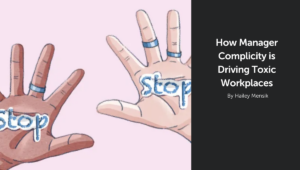Doing only what you need to do to not get fired — recently coined “quiet quitting” — is a normal human response to prolonged aversive events. Fortunately, it’s not permanent, and organizations can help reverse this trend by giving employees more autonomy, whether it’s the freedom to choose their schedules, where they work, or how they get work done. “The more freedom you can give them, the less they’ll feel the need to respond in unproductive ways,” write NLI’s David Rock and Jay Dixit in Harvard Business Review, where you can read more about the science behind quiet quitting.

Culture and Leadership
How Manager Complicity is Driving Toxic Workplaces
This article from WorkLife explores how employees believe the actions of their direct managers lead to the toxicity of the workplace, including insight from NLI’s Distinguished Faculty, Christy Pruitt-Haynes.





